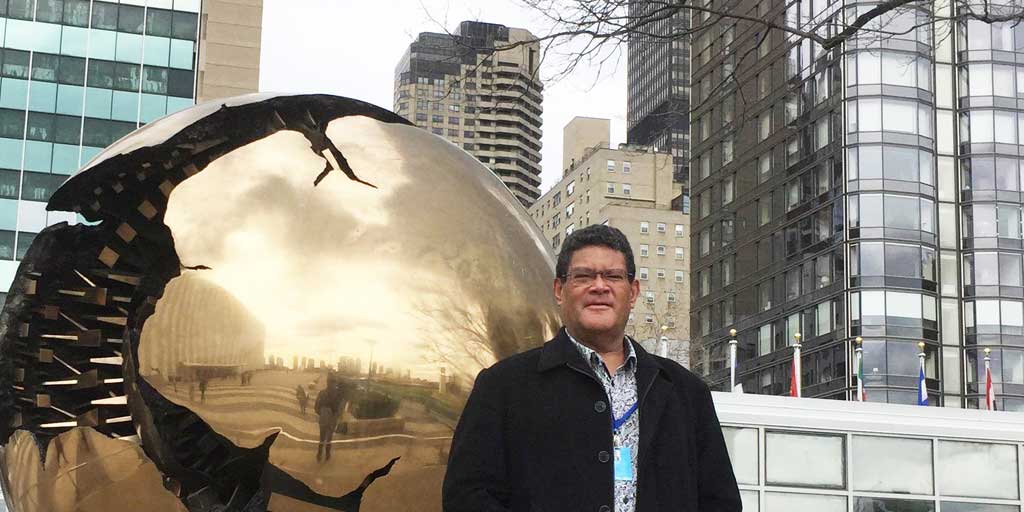Indigenous drug policy at the UN

He kaha te korero a te iwi Māori. Indigenous rights were forefront at the UN last month, and the Drug Foundation’s Gilbert Taurua was there to highlight how much unfair drug laws impact indigenous people around the world.
Gilbert Taurua is The Drug Foundation’s Principal Adviser, Tautāwhihia. He joined the United Nations Permanent Forum on Indigenous Issues in New York City last month, with the expressed purpose of promoting an international indigenous drug policy network.
Established in 2000, the UN Permanent Forum on Indigenous Issues is one of three bodies at the United Nations that deals with indigenous issues. This year’s theme was ‘collective rights to lands, territories and resources’.
Gilbert says indigenous voices were sadly lacking at the last United Nations General Assembly Special Session on Drugs (UNGASS). He found that sobering, given the extent to which drug laws affect indigenous people worldwide.
Because Māori are comparitively better off than some other nations, he says Aotearoa New Zealand is in a strong position to advocate for better drug laws. He called for other indigenous peoples to add their voices to the drug policy debate.
We need to focus on our own track record – we all know that Māori are 11 times more likely to be remanded in custody when charged with an offence, three times more likely to be arrested and three to four times more likely to be charged when arrested."
Gilbert Taurua, Principal Adviser, Tautāwhihia, NZ Drug FoundationThe collective strength of a global network could raise awareness of the heavy toll the global war on drugs has taken on indigenous people, and influence international agencies to prioritise indigenous drug policy.
The Drug Foundation formally requested the UN Permanent Forum on Indigenous Issues endorse the creation of an international indigenous drug policy reform network, and send a delegation to the 2019 UNGASS, to report back later that year.
Gilbert also hopes to secure a future visit from Special Rapporteur Victoria Tauli-Corpuz, who would recommend changes to our Government with the backing of the UN.
“Of course, it’s up to the Government as to whether they choose to listen to her suggestions.”
Faced with the enormity of human rights abuses happening every day around the world, Gilbert says even he was “blown away”.
Unsure how the issue of drug policy in New Zealand would stack up against the accounts of murder, rape and genocide being aired by other nations, he made a split-second decision to hand his speaking slot to Julia Whaipooti of JustSpeak, to highlight the issue of over-incarceration of Māori.
Julia Whaipooti, a human rights lawyer, said later that she and her companions were shocked to hear the “normalisation” of NZ statistics, presented by the Government. The proposed new mega-prison in Waikeria would only make matters worse.
Just back in the country, Gilbert says he found himself appreciating the comparative privilege of New Zealand’s constitutional freedoms. “I mean, you know these things go on but to hear it first-hand is pretty eye-opening ... I was hearing stories of people being taken out and executed, their bodies never found.”
He acknowledges Aotearoa New Zealand has more indigenous rights built into our legislation than many third-world nations – and even some of our close pacific neighbours. He noted the NZ Government wasn’t above a bit of self-congratulation for that dubious honour.
But making comparisons with the worst of the worst isn’t going to clean up our own backyard. “We need to focus on our own track record – we all know that Māori are 11 times more likely to be remanded in custody when charged with an offence, three times more likely to be arrested and three to four times more likely to be charged when arrested. Then once they’re charged, Māori are four times more likely to be convicted and seven times more likely to be sentenced to a prison term.”
Gilbert says it’s important to keep pressure on the government to address these issues.
The Foundation was fortunate to obtain a travel grant to attend this event. We continue to advance our intent to facilitate a national Māori drug policy summit in partnership with collaborating organisations Te Rau Matatini and Hapai te Hauora.
Recent news

Beyond the bottle: Paddy, Guyon, and Lotta on life after alcohol
Well-known NZers share what it's like to live without alcohol in a culture that celebrates it at every turn

Funding boost and significant shift needed for health-based approach to drugs
A new paper sets out the Drug Foundation's vision for a health-based approach to drug harm

Expert Pharmac committee recommends funding for overdose reversal nasal spray
The expert committee has said funding for naloxone in the community should be a high priority

